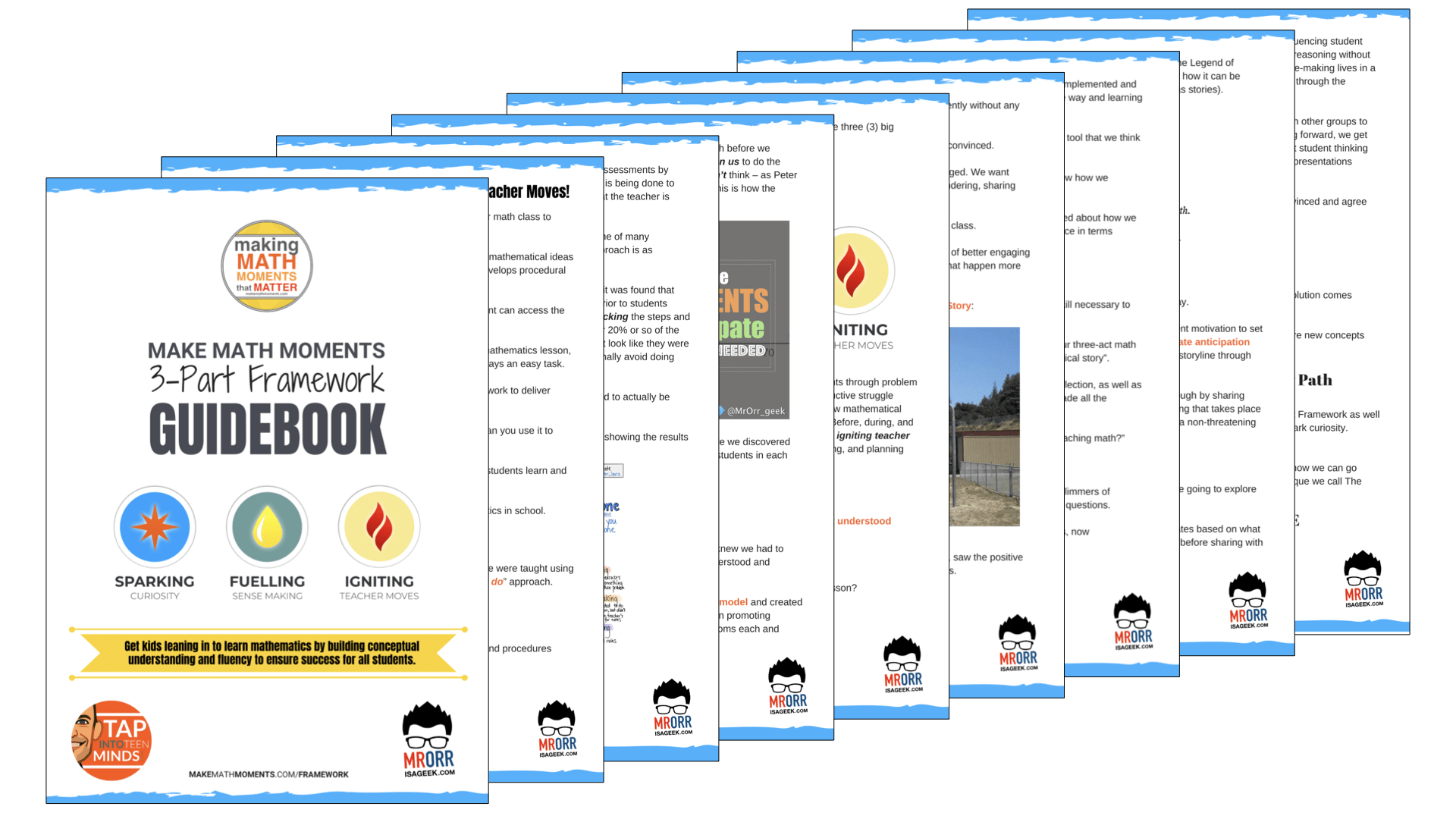How To Teach Algebra: Using A Double Number Line To Solve Multi-Step Equations
Help your students become more flexible and fluent with solving multi-step equations by showing them how to use a flexible model: The Double Number Line.
We all want our students to become consistent “equation solvers”, but let’s not achieve that at the expense of fluency!
In this video Jon will share examples of how to use a double number line to solve multi-step equations with variables on both sides of the equals sign, and mutli-step equations that involve parenthesis.
The walkthrough will teach YOU how to use the model so you can teach your students.
In particular, you’ll learn:
- How to use a double number line to solve a variety of first degree equations including multi-step equations;
- How to build procedural fluency by teaching strategies to use along the double number line; and,
- Which math lessons you can use in your classroom to bring about the use of these strategies and models.
Resources Related To The Video
- Watch our video on how to use 3 models to solve 2-step equations.
- Pentomino Puzzles & Solving Equations
- Popcorn Pandemonium & Systems of Equations
- Learn about the Curiosity Path by reading our 3-Part Framework
- Check out the Shot Put [Algebraic Substitution & Solving] Problem Based Math Unit
- Visit Make Math Moments Problem Based Math Lessons page for other useful problem based units
- Take the pledge to transform your current math curriculum into those lessons that you’ve been searching the web for by applying the Curiosity Path.
- Up your pedagogical and content knowledge game by joining our Make Math Moments Teacher Academy!
Want to Run Problem Based Lessons Without a Hitch In Your Classroom?
Head over to the Make Math Moments 3-Part Framework page to dive right in or click below to download the guidebook to take with you!
DOWNLOAD THE 3-PART FRAMEWORK GUIDEBOOK

Why not bring the 3-Part Framework Guidebook with you?
Download the PDF so you can share with your professional learning network via print or email!
LESSONS TO MAKE MATH MOMENTS
Each lesson consists of:
Each Make Math Moments Problem Based Lesson consists of a Teacher Guide to lead you step-by-step through the planning process to ensure your lesson runs without a hitch!
Each Teacher Guide consists of:
- Intentionality of the lesson;
- A step-by-step walk through of each phase of the lesson;
- Visuals, animations, and videos unpacking big ideas, strategies, and models we intend to emerge during the lesson;
- Sample student approaches to assist in anticipating what your students might do;
- Resources and downloads including Keynote, Powerpoint, Media Files, and Teacher Guide printable PDF; and,
- Much more!
Each Make Math Moments Problem Based Lesson begins with a story, visual, video, or other method to Spark Curiosity through context.
Students will often Notice and Wonder before making an estimate to draw them in and invest in the problem.
After student voice has been heard and acknowledged, we will set students off on a Productive Struggle via a prompt related to the Spark context.
These prompts are given each lesson with the following conditions:
- No calculators are to be used; and,
- Students are to focus on how they can convince their math community that their solution is valid.
Students are left to engage in a productive struggle as the facilitator circulates to observe and engage in conversation as a means of assessing formatively.
The facilitator is instructed through the Teacher Guide on what specific strategies and models could be used to make connections and consolidate the learning from the lesson.
Often times, animations and walk through videos are provided in the Teacher Guide to assist with planning and delivering the consolidation.
A review image, video, or animation is provided as a conclusion to the task from the lesson.
While this might feel like a natural ending to the context students have been exploring, it is just the beginning as we look to leverage this context via extensions and additional lessons to dig deeper.
At the end of each lesson, consolidation prompts and/or extensions are crafted for students to purposefully practice and demonstrate their current understanding.
Facilitators are encouraged to collect these consolidation prompts as a means to engage in the assessment process and inform next moves for instruction.
In multi-day units of study, Math Talks are crafted to help build on the thinking from the previous day and build towards the next step in the developmental progression of the concept(s) we are exploring.
Each Math Talk is constructed as a string of related problems that build with intentionality to emerge specific big ideas, strategies, and mathematical models.
Make Math Moments Problem Based Lessons and Day 1 Teacher Guides are openly available for you to leverage and use with your students without becoming a Make Math Moments Academy Member.
Use our OPEN ACCESS multi-day problem based units!
Make Math Moments Problem Based Lessons and Day 1 Teacher Guides are openly available for you to leverage and use with your students without becoming a Make Math Moments Academy Member.
Partitive Division Resulting in a Fraction
Equivalence and Algebraic Substitution
Represent Categorical Data & Explore Mean
Downloadable resources including blackline masters, handouts, printable Tips Sheets, slide shows, and media files do require a Make Math Moments Academy Membership.
Use our OPEN ACCESS multi-day problem based units!





It seems so interesting!!
Great article! Your writing style is informative and engaging, making it a pleasure to read. I especially appreciated the well-researched insights and clear explanations. Keep up the excellent work!